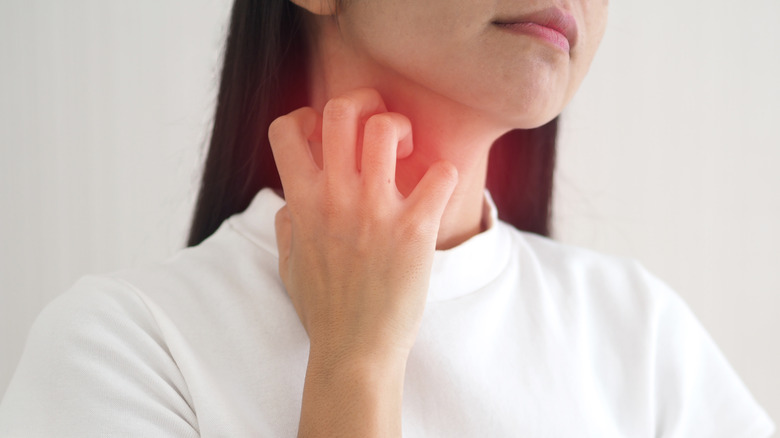Is There A Link Between Chronic Hives And Thyroid Disease?
The American Academy of Dermatology Association describes hives as a skin condition that appears as itchy red bumps, welts, or a rash. Hives can appear anywhere on the face and body and are often painful and irritating. Also called urticaria, hives are often part of an allergic reaction, according to NHS inform. However, hives may be triggered by environmental factors like heat or cold, infections like cold or flu viruses, certain medications, and prolonged or emotional stress. And recent studies suggest there may be a link between chronic hives and thyroid disease.
Most cases of hives diminish within a few weeks, and a 2018 study by the European Academy of Allergy and Clinical Immunology (EAACI) states that the lifetime prevalence of hives is 20% worldwide. But according to the Mayo Clinic, hives are considered chronic if they persist for more than six weeks. Luckily, these cases are much lower, around 0.5-5%, according to a 2017 study in Allergy, Asthma & Immunology Research. Although hives may often appear as an allergic reaction, the causes behind chronic hives often remain unknown. Autoimmune diseases like thyroid disease can randomly trigger bouts of chronic hives that persist for months or years without any attributable pattern.
How are chronic hives linked to thyroid disease?
According to the American Osteopathic College of Dermatology, around 95% of chronic hives cases have no discernible cause. But a 2017 review published by the EAACI found strong links between chronic hives and thyroid disease, particularly the Hashimoto's type of hypothyroidism. The same review reveals associations between chronic hives and Graves' disease, a hyperthyroid condition. Still, chronic hives appear more often with Hashimoto's than with Graves' disease.
A 2020 review published in the World Allergy Organization Journal notes that chronic hives and thyroid disease share several factors, especially with Hashimoto's. In both cases, high levels of the immune-boosting protein interleukin-6 (IL-6) and Th17 cells combined with low levels of immune-suppressing T-cells seem responsible for activating symptoms of both conditions. And both conditions show the presence of antithyroid antibodies that attack the thyroid.
Whether chronic hives are linked to thyroid disease or remain undiagnosed, the Mayo Clinic recommends taking over-the-counter antihistamines and histamine blockers to help relieve discomfort. Doctor-prescribed anti-inflammatory corticosteroids or monoclonal antibodies can help reduce the severity of symptoms. And getting enough sleep, avoiding trigger foods, staying cool, and managing stress may help reduce the severity or frequency of symptoms.


